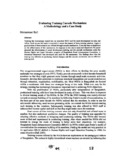| dc.contributor.author | Rafi, Mohammad | |
| dc.date.accessioned | 2019-12-17T09:11:31Z | |
| dc.date.available | 2019-12-17T09:11:31Z | |
| dc.date.issued | 2004 | |
| dc.identifier.citation | Rafi, M. (2004). Evaluating training cascade mechanism: a methodology and a case study. Research Reports (2004): Social Studies, Vol – XXXIV, 12–36. | en_US |
| dc.identifier.uri | http://hdl.handle.net/10361/13287 | |
| dc.description.abstract | Training has increasingly turned into an important NGO tool for rural development in Asia and
Africa. Such an use has made it essential to assess the impact of these training sessions. Again a
good portion of these sessions are offered through cascade mechanism. There has been a skepticism
on the effectiveness of this mechanism. In response to the above need and skepticism the paper
assessed the effectiveness of social development training and the caseade mechanisms under the
Human Rights and Legal Education program of Bangladesh Rural Advancement Committee. A
theoretical framework was developed and used for the assessment. The findings show that the
training was effective in producing desired changes and the cascade mechanism was an effective
training tool. | en_US |
| dc.language.iso | en | en_US |
| dc.publisher | BRAC Research and Evaluation Division (RED) | en_US |
| dc.subject | Training | en_US |
| dc.subject | Cascade mechanism | en_US |
| dc.subject | NGO | en_US |
| dc.subject | BRAC | en_US |
| dc.subject | Human Rights and Legal Education Programme (HRLEP) | en_US |
| dc.subject.lcsh | Non-governmental organizations -- Bangladesh. | |
| dc.subject.lcsh | Employees -- Training of. | |
| dc.subject.lcsh | Supervision of employees -- Study and teaching. | |
| dc.title | Evaluating training cascade mechanism: a methodology and a case study | en_US |
| dc.type | Research report | en_US |

